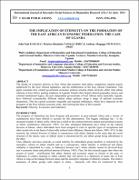| dc.contributor.author | KASUJJA, John Paul | |
| dc.contributor.author | AMALE, Maurice Bakaluba T | |
| dc.contributor.author | MUWAGGA, Anthony Mugagga | |
| dc.date.accessioned | 2018-08-01T07:31:50Z | |
| dc.date.available | 2018-08-01T07:31:50Z | |
| dc.date.issued | 2014 | |
| dc.identifier.citation | KASUJJA, J.P. and MUWAGGA, A.M., THE IMPLICATION OF ETHNICITY ON THE FORMATION OF THE EAST AFRICAN ECONOMIC FEDERATION: THE CASE OF UGANDA. | en_US |
| dc.identifier.issn | 2354-2926 | |
| dc.identifier.uri | http://hdl.handle.net/20.500.12280/569 | |
| dc.description.abstract | The design of economic policies in East Africa that promote inter-ethnic cooperation remains poorly understood by the East African legislators, and the architectures of the East African Federation. This paper examines how central government economic policies towards ethnic diversity affect inter-ethnic relations in East Africa, putting emphasis on Uganda. Despite their largely shared geography, history and colonial institutional legacy, the post independent governments of East African states especially Uganda, have followed economically different radical ethnic policies along a range of national economic dimensions. This has caused economic inequality and regional imbalances, which have impacted on the prospects of the East African economic unity, thus forming the basis of this research. | en_US |
| dc.language.iso | en | en_US |
| dc.publisher | International Journal of Innovative Social Sciences & Humanities Research | en_US |
| dc.subject | Ethnicity | en_US |
| dc.subject | Economics and Federation. | en_US |
| dc.title | The Implication of Ethnicity on the Formation of The East African Economic Federation: The Case Of Uganda | en_US |
| dc.type | Article | en_US |


